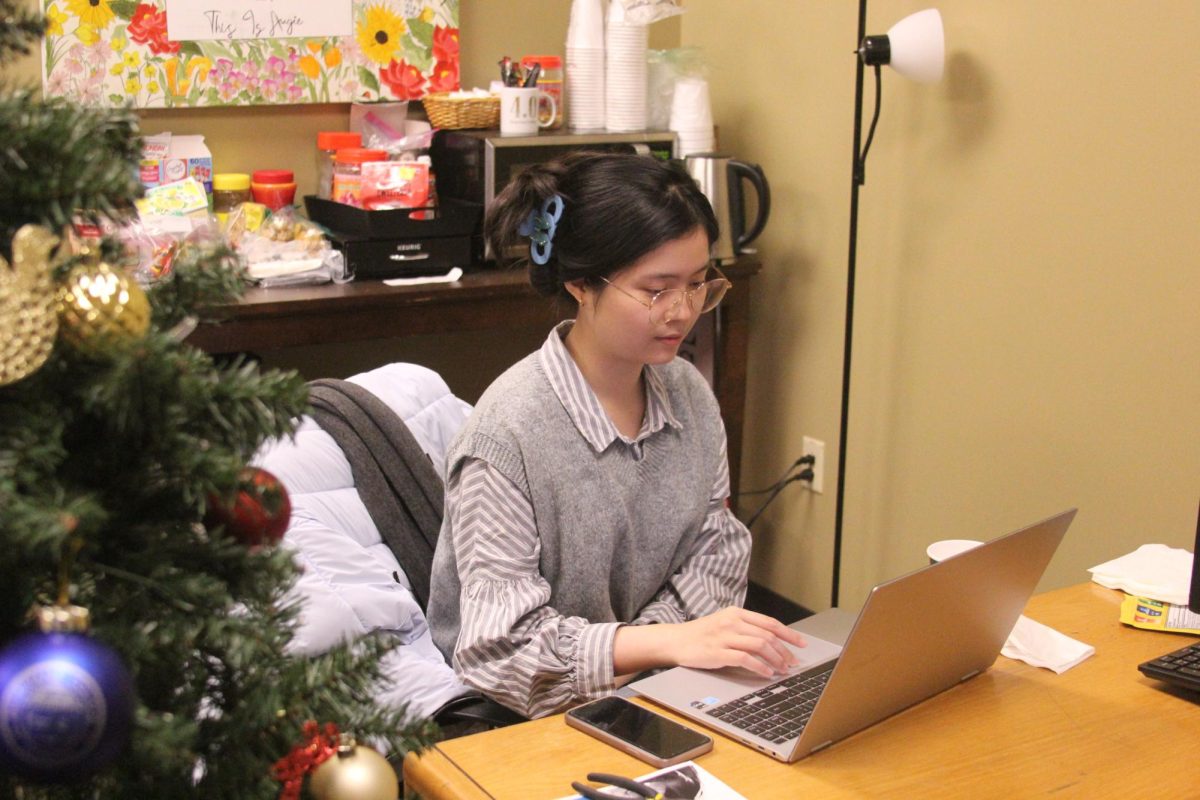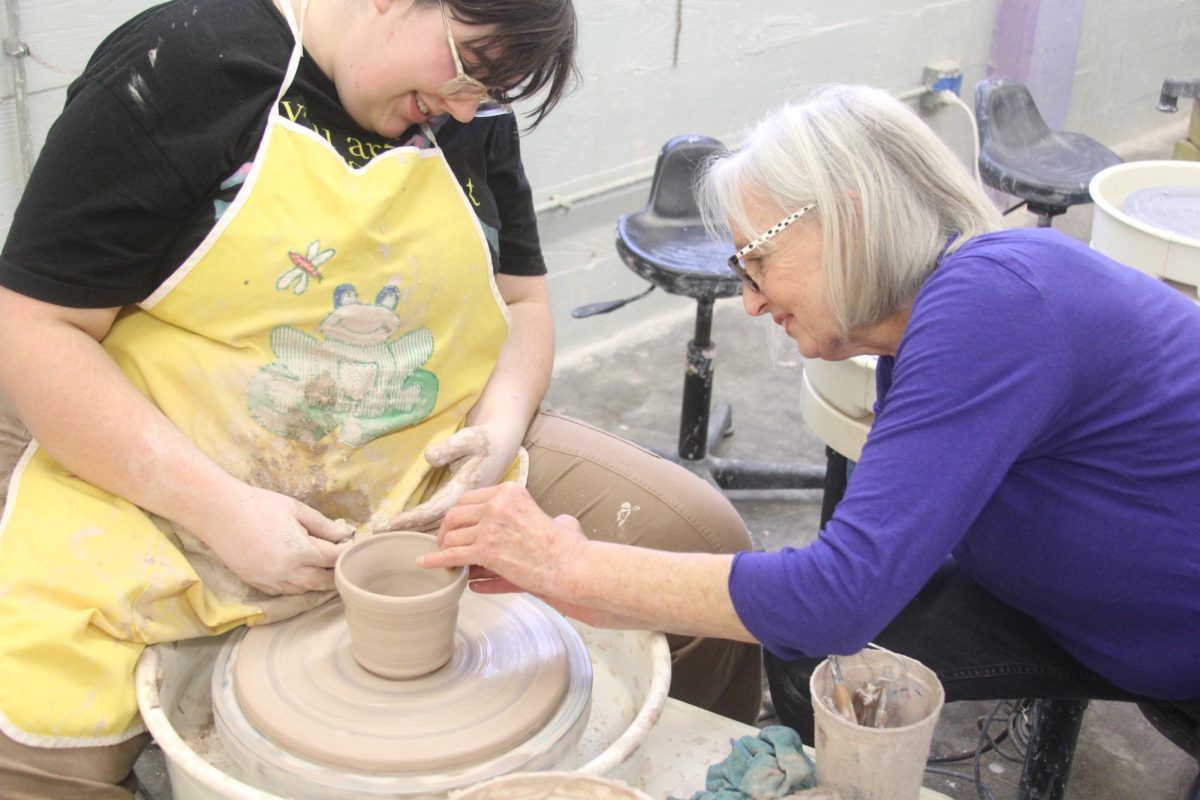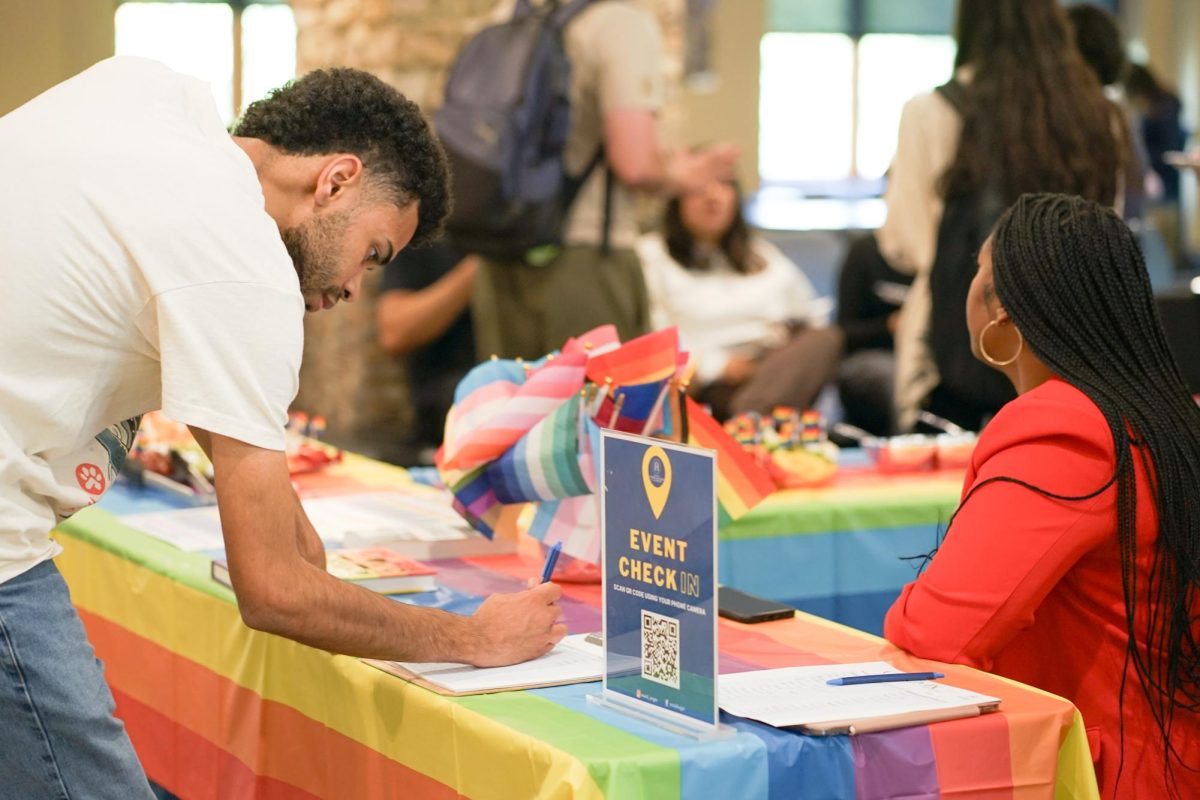
At all times, different Christian Care volunteers stay at the safe houses with the clients. Volunteers who work during the night shift arrive at 4 p.m. and stay until the morning. There is an office space in each house for volunteers and Christian Care employees to work.
She’s been in hiding for four months. But for the first time, Mary Hill has found peace.
She sits in her new bedroom in Rock Island. Curfew is 6 p.m., but she doesn’t mind. She has time to herself, time to reflect. She puts her feet up, takes her medication and uses a mirror to see what the marks on her back look like today.
Hill has never experienced a quiet like this before.
“There’s no fighting, no screaming, no yelling,” Hill explains. “It’s easier to mend yourself this way.”
Four months ago, Hill made a phone call that would change her life. In need of back and neck surgery, Hill knew she had to escape. She left her job, her home and her last abusive relationship.
“It’s the first time I’ve had enough courage,” Hill said.
Hill, 51 years old, had been in an on-and-off relationship with her boyfriend for four years. He was abusive the entire relationship, but Hill said her previous partners were worse.
“I had my oldest son when I was pretty young,” Hill said. “His dad was an alcoholic and he was abusive when he drank. I guess I didn’t know the difference, I was so young. Then, it was one abusive relationship to another.”
She was living with her most recent boyfriend. Hill said they broke up about three times throughout the relationship, but she could never completely leave.
“After battling through my last relationship, I was tired of the lies,” Hill said. “He kept saying he would get help.”
After years of emotional and physical abuse, Hill decided “enough is enough.”
“I got tired of having my hair ripped out of my head every day,” Hill said. “I got tired of being thrown down the stairs.”
One day, she realized just how trapped she was.
“He ripped the phone out of the wall,” Hill recalled. “He threw my cellphone out of the car window. He wanted to cut me out from the whole world.”
When she realized nothing was working, Hill left to stay in a shelter in Davenport.
“It was a zoo in there,” Hill said. “It wasn’t like here. There were no rules basically. It was full and a mess. People were up all night, gone for days. There were people yelling and cussing in front of the kids. It was craziness.”
Hill shared one of the shelter’s apartments with a woman and 3 kids. There were four beds for the five of them, and she said you could barely see them.
Along with the chaos, Hill often felt unsafe.
“Domestic violence is domestic violence,” Hill said. “The address of your safe house is supposed to be unknown. But, sometimes the abusers would drop off the women.”
…
Hill searched through the Quad City directory and found the number for Christian Care Center in Rock Island. One call to Christian Care Program and Services Manager, Kris Hull-Houghton, made Hill realize her life could change.
Christian Care is one of two domestic violence shelters in the Quad Cities. Started 98 years ago as a rescue mission for homeless men, the nonprofit now also runs safe houses for victims of abuse, Hill-Houghton said.
During the call, Hill described her situation to Hull-Houghton.
“She asks questions, sees if this is right for you,” Hill said. “Then you go in, she takes an intake, you give her your driver’s insurance and she runs a background check. You have to do a drug and alcohol test, and she shows you the house. When you’re ready to leave, you have 24 hours.”
Hill decided to give Christian Care a chance, “hoping and praying it would be different.”
She moved in October, when the house was at full capacity. Five adults and five kids shared the house in Rock Island, which has an address unknown to anyone outside of Christian Care.
“I didn’t think I’d like it here,” Hill admitted. “But, it’s a real house. It’s a real home. I have a real bedroom, with a real bed. I have a real alarm clock.”
Most shelters have a 30 day limit for clients, but Hull-Houghton said that’s unrealistic.
“We looked at our program and decided if you want to help them find a house, a job, childcare and everything else, that’s going to take some time,” Hull-Houghton said.
She said Christian Care residents stay an average of four months. But, they’ve had clients stay as long as two years, when physical therapy, surgery and other procedures are needed.
“This place is one in a million,” Hill said.
Hill realizes the program offered through Christian Care is extremely rare. Hull-Houghton, her small staff and volunteers provide classes, counseling and group sessions for residents. She also meets one-on-one with clients to help them prepare for the future.
“We offer educational opportunities, job searches, we’ve had attorneys come– anything not readily available to them,” Hull-Houghton said.
“I studied business years ago,” Hill said. “I’d like to go to a university setting and go back to school. Right now I applied for disability, so I’m off work for a year until my medical issues resolve.”
Hull-Houghton said they treat every case individually.
“All the girls are starting over, but maybe in a different manner,” Hill said.”No one here is the same. But, we’re all here because of abuse. That’s the one thing we have in common.”
…
Christian Care residents have something else in common, though: they’re all waiting to find housing.
“The biggest problem is housing,” Hull-Houghton said. “The Quad Cities don’t have enough housing for individuals to find a place.”
Hill is currently on a waiting list to get an apartment with the Rock Island Housing Authority, and she won’t be able to have her needed surgery until then.
“I’ll be bedridden for a while,” Hill said. “I can’t be in and out of homes. So, I’m waiting to get to the top of that list so I can schedule my surgery. I’ll recoup from that and then go back to school.”
The situation is slightly different for women with children. Hill’s housemate Sherita Preston, 27, is struggling to find a home for herself and four of her five children.
“I’ve been filling out housing applications,” said Preston, who has stayed at the safe house in Rock Island since Jan. 2. “I’m just at a standstill, waiting to be accepted. But, still I just do what I gotta do. This isn’t a permanent home. But, why not start here?”
Preston had more stipulations than single residents when she applied to stay at the Christian Care shelter. The shelter had never had a woman stay with that many children, so she stayed on a two week probationary period until the Christian Care employees knew the living situation would be fine.
For now, Preston is adjusting to her temporary home. Her family is staying in the house’s biggest room, with a bunk bed, one twin and one pull-out bed. Unlike many kids who come to the shelter from different cities, Preston’s children were able to continue school in Moline.
Preston has four daughters, ranging in ages from five to nine. Every week, like the adults, they have group classes and individual meetings with Hull-Houghton. The rules of the house are strict, and they are given prizes for good behavior. Fighting, yelling and refusal to do chores are grounds for dismissal.
“I’m just thankful the Lord got me somewhere to stay,” Preston said. “I was worried about being judged. But, they’re helping me do stuff so I’m set when I get out there. Me and my kids won’t be in that situation again.”
After leaving her abusive boyfriend, Preston lost her house and had to quit her job.
“I was just tired,” Preston explained. “I was trying to do too many poor things. I realized just because something is familiar, doesn’t mean it’s not wrong. I started changing, started getting back into the world.”
Since arriving at Christian Care, Preston has been able to get new prescription glasses. And, she’s signed up for GED classes starting in February. Once she finds a more permanent home, she plans to attend Black Hawk College and enroll in the nursing program.
“I’m not looking in the past no more,” Preston said. “I’ll get pulled back in if I do. But, I’m not ashamed anymore.”
…
Hill said the point of Christian Care’s program is to teach abuse victims how to be independent.
“They want to teach us to run a house by ourselves,” Hill elaborated. “Some of the women have never lived alone before. They’ve been pushed in a corner, the man had the checkbook or the cash the whole time, and they’ve never had to handle that before. In some situations, they have been prostituted out and abused, so they’ve never had a place before.”
Many residents don’t stay long, though. Hill said people are often unhappy with the early curfew and strict drug and alcohol rules, and leave within several days.
Last year, the domestic shelter housed 45 women and 34 kids, Hull-Houghton said. In her eight years working for Christian Care, Hull-Houghton has helped people of all ages, from age 0 to 70.
“I think we definitely try to be progressive in our approach with these clients,” Hull-Houghton said. “We help in terms of much needed housing and programs for the individual to get back up on their feet. Having them, we try to put a spotlight on homelessness and domestic violence.”
Approximately 1.3 million women are victims of physical assault by an intimate partner every year, according to “Costs of Intimate Partner Violence Against Women in the United States,” a study released by the Center for Disease Control and Prevention. Intimate partner violence results in 18.5 million mental health care visits a year, and is to blame for the loss of over 32,000 full-time jobs.
“Compared to 3,000 animal shelters in the United States, we’re one of only 1,500 domestic violence shelters,” Hull-Houghton said. “We have the awareness of the issues of domestic violence, but it’s implementing these policies that actually help these individuals.”
Hull-Houghton said there’s simply not enough people working to help victims of abuse. Christian Care has worked with people from all 50 states, and has had clients from as far as Vietnam and Africa.
Christian Care also offers a rescue shelter for homeless men and serves meals every day, three meals a day. Hull-Houghton said the meal site serves on average 60,000 meals a year. Christian Care also offers a 24-hour crisis line, and accepts referrals from other area shelters.
“All of our facilities focus on the individual,” Hull-Houghton said. “We focus on the mind, body and soul transformation.”
Oftentimes, Christian Care has to turn people away, though. She said they only have the resources for so many, and everything is funded through private donations.
“We get all kinds of food donations,” Hill said. “(Target) donates, Panera donates a lot. So many people donate it’s unbelievable. I thank God for those people every single day.”
But, Hull-Houghton said they can always use more.
“The need has increased and the funds have decreased,” Hull-Houghton said. “Volunteers for the crisis line would be helpful. There’s always a need list, that we put out monthly. Top of the list is deodorant, disinfectant and trash bags.”
Hill said sometimes previous Christian Care clients come back to collect needed toiletries and food.
“This is a loving and trusting place,” Hill said. “Nobody here is going to do you wrong.”
Hill and Preston said more women should be referred to Christian Care.
“If it’s really unhealthy and unsafe, get out,” Preston said. “There’s more to life than just that. You can do it. It’s scary because so many women get killed because of this.”
But in their secluded home, Hill, Taylor and their other “sisters,” as Hill called them, for once are able to forget, heal and enjoy silence.
“I feel like I’m more at peace,” Hill said. “My anxiety has calmed down, and not just because I’m on meds, but because this house is peaceful. There’s no drama going on, no fighting. No one raises their voices. That’s something new. I like that. I want more of that.”
Christian Care’s 24-hour crisis phone number is 309-788-2273. Donations can be sent to PO Box 4176, Rock Island, IL, 61204.
Note: All Christian Care Client names have been changed for the protection of the individual.





































































































